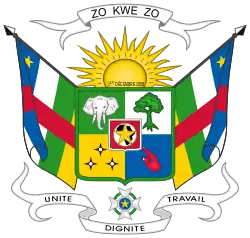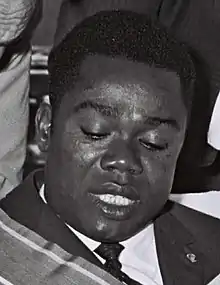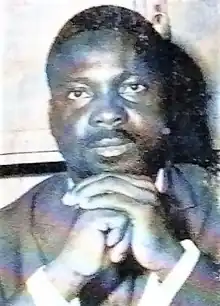1981 Central African presidential election
Presidential elections were held in the Central African Republic on 15 March 1981.[1] They were the first national elections of any sort since 1964, the first elections since the overthrow of longtime ruler Jean-Bédel Bokassa in 1979, and the first multiparty presidential elections since independence. Five candidates—incumbent president David Dacko, Ange-Félix Patassé, François Pehoua, Henri Maïdou and Abel Goumba—stood in the election.
| |||||||||||||||||||||
| Turnout | 76.66% | ||||||||||||||||||||
|---|---|---|---|---|---|---|---|---|---|---|---|---|---|---|---|---|---|---|---|---|---|
| |||||||||||||||||||||
| |||||||||||||||||||||
 |
|---|
|
|
The elections were won by Dacko, who had been restored to power two years earlier as part of Operation Barracuda, which overthrew Emperor Bokassa I (Jean-Bédel Bokassa). Dacko tried to pose as the inheritor of Barthélemy Boganda, the national hero who founded the country.
Results
| Candidate | Party | Votes | % | |
|---|---|---|---|---|
| David Dacko | Central African Democratic Union | 374,027 | 51.10 | |
| Ange-Félix Patassé | Movement for the Liberation of the Central African People | 283,739 | 38.77 | |
| François Pehoua | Independent Grouping for Reflection | 39,661 | 5.42 | |
| Henri Maïdou | Republican Progressive Party | 24,007 | 3.28 | |
| Abel Goumba | Oubanguian Patriotic Front | 10,512 | 1.44 | |
| Total | 731,946 | 100.00 | ||
| Valid votes | 731,946 | 98.29 | ||
| Invalid/blank votes | 12,742 | 1.71 | ||
| Total votes | 744,688 | 100.00 | ||
| Registered voters/turnout | 971,395 | 76.66 | ||
| Source: EISA | ||||
References
- Nohlen, D, Krennerich, M & Thibaut, B (1999) Elections in Africa: A data handbook, p210 ISBN 0-19-829645-2
This article is issued from Wikipedia. The text is licensed under Creative Commons - Attribution - Sharealike. Additional terms may apply for the media files.

